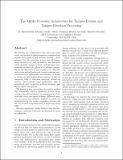Notice
This is not the latest version of this item. The latest version can be found at:https://dspace.mit.edu/handle/1721.1/149977.4
The AEGIS Processor Architecture for Tamper-Evident and Private Tamper-Resistant Processing
Author(s)
Suh, G. Edward; Clarke, Dwaine; Gassend, Blaise; van Dijk, Marten; Devadas, Srinivas
DownloadMIT-LCS-TR-883.pdf (369.9Kb)
Metadata
Show full item recordAbstract
We describe the architecture of the AEGIS processor which can be used to build computing systems secure against both physical and software attacks. AEGIS assumes that the operating system and all components external to it, such as memory, are untrusted. AEGIS provides tamper-evident, authenticated environments in which any physical or software tampering by the adversary is guaranteed to be detected, and private and authenticated, tamper-resistant environments where additionally the adversary is unable to obtain any information about software or data by tampering with, or otherwise observing, system operation. AEGIS enables many applications, such as commercial grid computing, software licensing, and digital rights management. We present a new encryption/decryption method that successfully hides a significant portion of encryption/decryption latency, in comparison to a conventional direct encryption scheme. Efficient memory encryption and integrity verification enable the implementation of a secure computing system with the only trusted component being a single-chip AEGIS CPU. Detailed simulation results indicate that the performance overhead of security mechanisms in AEGIS is reasonable.
Date issued
2003-01Series/Report no.
MIT-LCS-TR-883